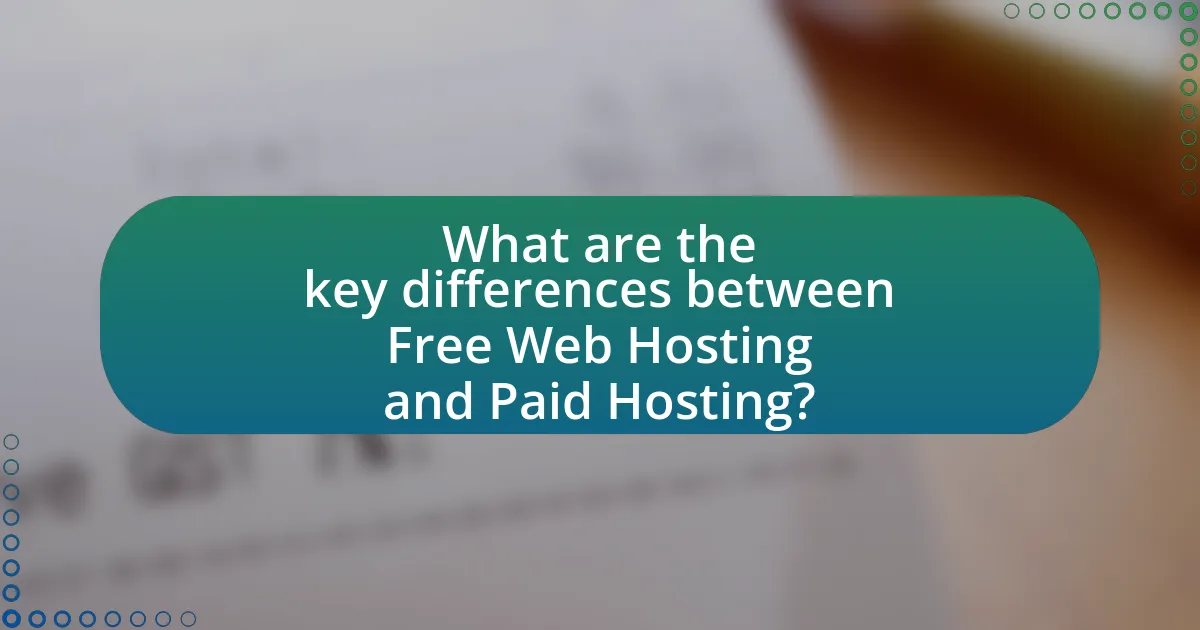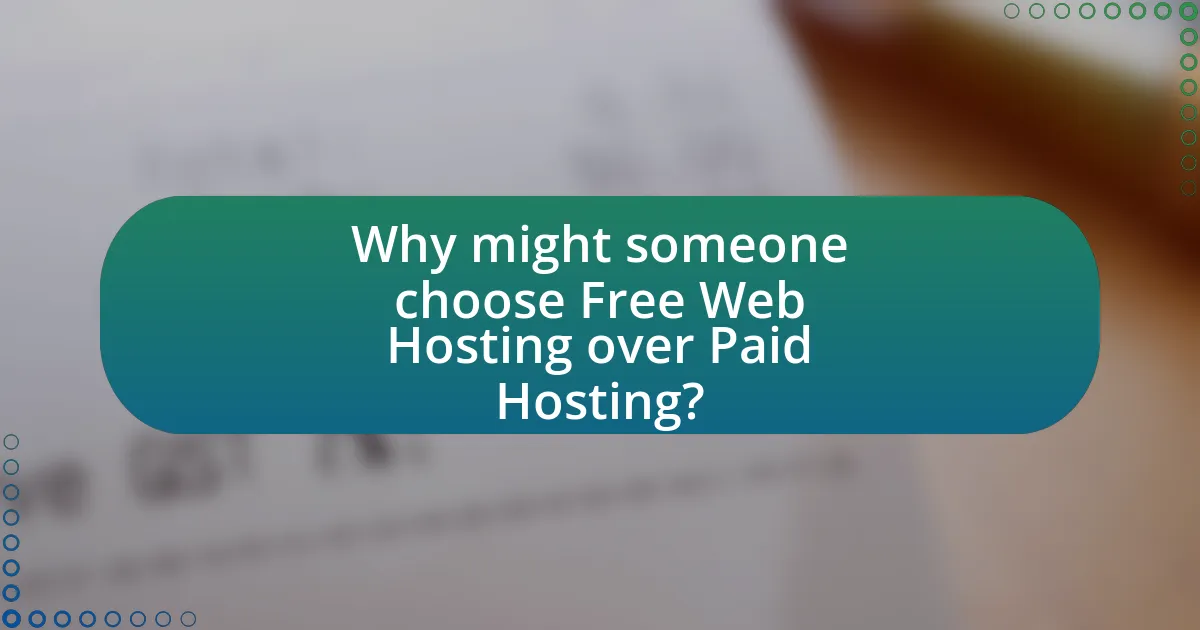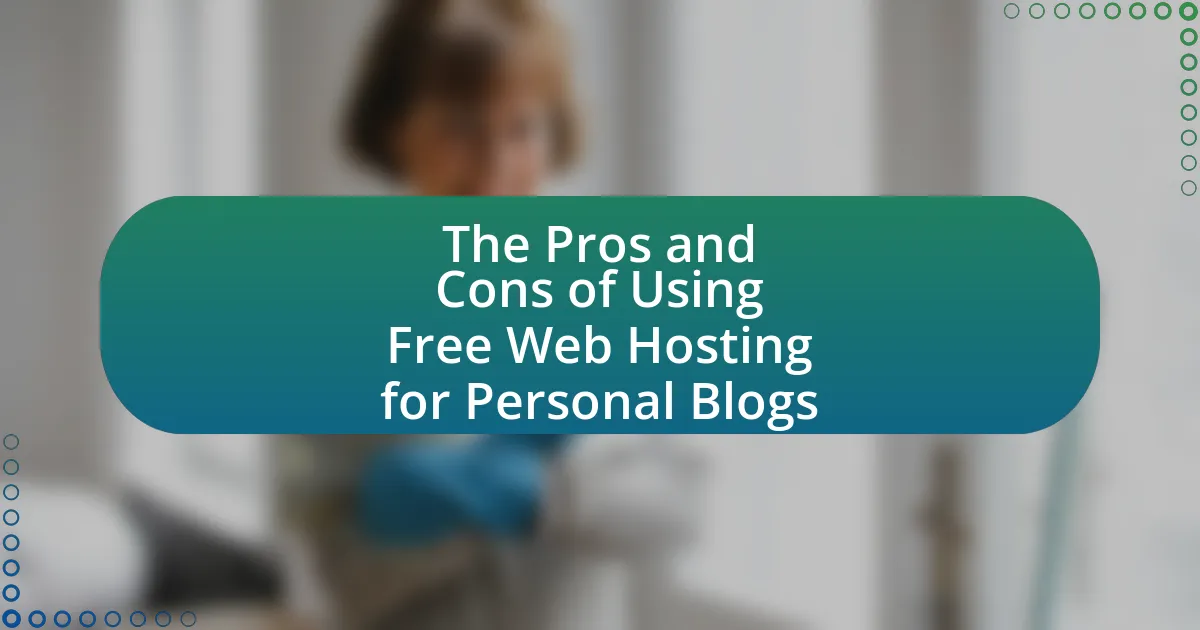The article examines the key differences between free web hosting and paid hosting, highlighting the limitations of free services, such as restricted resources, bandwidth, and customer support, as well as the presence of advertisements. It discusses the advantages of paid hosting, including enhanced performance, reliability, and security features, along with dedicated customer support. The article also explores common use cases for free hosting, potential drawbacks, and factors to consider when deciding whether to upgrade to paid hosting, ultimately emphasizing the long-term benefits of investing in a paid hosting solution for serious projects and businesses.

What are the key differences between Free Web Hosting and Paid Hosting?
Free web hosting typically offers limited resources, features, and support compared to paid hosting. Free hosting often includes advertisements, restricted bandwidth, and minimal storage, while paid hosting provides greater reliability, enhanced performance, and customer support. For instance, a study by HostingAdvice found that paid hosting services can offer uptime guarantees of 99.9%, whereas free hosting may not guarantee uptime, leading to potential website downtime. Additionally, paid hosting often allows for custom domain names, which enhances branding, while free hosting usually requires the use of subdomains.
What features are typically offered in Free Web Hosting?
Free web hosting typically offers features such as limited storage space, bandwidth, and basic website builders. Users often receive subdomain names instead of custom domains, and advertisements may be displayed on their sites. Additionally, free hosting services usually provide limited customer support and may lack advanced features like SSL certificates or email hosting. These limitations are common across various free hosting providers, making them suitable primarily for personal projects or small websites.
How does storage capacity differ between Free and Paid Hosting?
Free hosting typically offers limited storage capacity, often ranging from 500 MB to 2 GB, while paid hosting plans generally provide significantly more storage, starting from 10 GB and going up to unlimited options. This difference is due to the business model of free hosting services, which often restrict resources to encourage users to upgrade, whereas paid hosting services invest in infrastructure to accommodate larger storage needs for their customers.
What limitations do Free Hosting services impose on bandwidth?
Free hosting services typically impose significant limitations on bandwidth, often capping it at a low threshold, such as 1GB to 10GB per month. These restrictions can lead to slow loading times and potential downtime if the bandwidth limit is exceeded, which can negatively impact user experience and website performance. For example, many free hosting providers may throttle bandwidth during peak usage times or restrict access to the site altogether once the limit is reached, making it unsuitable for high-traffic websites.
What advantages does Paid Hosting provide over Free Hosting?
Paid hosting offers several advantages over free hosting, primarily in terms of reliability, performance, and support. Paid hosting typically provides dedicated resources, ensuring faster load times and better uptime, which is crucial for maintaining a professional online presence. For instance, paid hosting services often guarantee 99.9% uptime, while free hosting may experience frequent downtimes due to shared resources. Additionally, paid hosting includes customer support, often available 24/7, which is essential for resolving technical issues promptly. In contrast, free hosting usually lacks reliable support, leaving users to troubleshoot problems on their own. Furthermore, paid hosting allows for greater customization and control over the website, including the ability to use custom domains and access advanced features, which are often restricted in free hosting plans.
How does customer support differ between Free and Paid Hosting options?
Customer support significantly differs between free and paid hosting options, with paid hosting typically offering more comprehensive and responsive support. Free hosting services often provide limited customer support, which may include basic FAQs or community forums, while paid hosting plans usually include 24/7 access to professional support teams via multiple channels such as live chat, email, and phone. This distinction is evident as many paid hosting providers, like Bluehost and SiteGround, guarantee faster response times and dedicated assistance, ensuring that issues are resolved promptly, which is crucial for maintaining website uptime and performance.
What security features are enhanced in Paid Hosting services?
Paid hosting services enhance security features by offering dedicated firewalls, SSL certificates, and regular malware scanning. These features provide robust protection against cyber threats, ensuring that websites are safeguarded from unauthorized access and data breaches. For instance, dedicated firewalls filter incoming and outgoing traffic, while SSL certificates encrypt data transmitted between the server and users, significantly reducing the risk of interception. Additionally, regular malware scanning detects and removes harmful software, further securing the hosting environment. These enhancements are critical for businesses that prioritize data integrity and customer trust.

Why might someone choose Free Web Hosting over Paid Hosting?
Individuals might choose free web hosting over paid hosting primarily due to cost savings. Free web hosting services eliminate the financial burden associated with monthly or annual fees, making them attractive for personal projects, small businesses, or startups with limited budgets. Additionally, free hosting often provides essential features such as basic website builders and limited storage, which can be sufficient for users who do not require advanced functionalities. According to a survey by HostingAdvice, 70% of new website owners initially opt for free hosting to test their ideas before committing to paid services.
What are the common use cases for Free Web Hosting?
Common use cases for free web hosting include personal websites, small business sites, educational projects, and hobbyist blogs. Personal websites often utilize free hosting to establish an online presence without financial commitment. Small businesses may use free hosting for basic informational sites to test their market presence. Educational projects frequently leverage free hosting for student portfolios or class assignments, allowing easy access to online resources. Hobbyist blogs benefit from free hosting by providing a platform for sharing interests without incurring costs. These use cases demonstrate the practicality of free web hosting for individuals and organizations with limited budgets or specific needs.
How do personal projects benefit from Free Hosting solutions?
Personal projects benefit from free hosting solutions by providing an accessible platform for experimentation and learning without financial risk. Free hosting allows individuals to launch websites, test ideas, and develop skills in web development and design. According to a survey by HostingAdvice, 70% of users reported that free hosting helped them gain practical experience and confidence in managing online projects. This hands-on experience is crucial for personal growth and can lead to more advanced projects in the future.
What role does budget play in choosing Free Hosting for startups?
Budget plays a critical role in choosing free hosting for startups, as it directly influences the decision-making process regarding available resources. Startups often operate with limited financial resources, making free hosting an attractive option to minimize initial costs. According to a survey by Statista, 62% of startups cite budget constraints as a primary factor in their operational decisions. Free hosting allows startups to allocate funds to other essential areas, such as product development and marketing, while still establishing an online presence. However, the limitations of free hosting, such as bandwidth restrictions and lack of customer support, can impact long-term growth, necessitating a careful evaluation of budget versus potential future needs.
What are the potential drawbacks of using Free Web Hosting?
The potential drawbacks of using free web hosting include limited storage and bandwidth, lack of customer support, and the presence of advertisements on hosted sites. Free web hosting services often impose strict limits on storage space and bandwidth, which can hinder website performance and scalability. Additionally, these services typically do not offer reliable customer support, leaving users without assistance during technical issues. Furthermore, many free hosting providers display ads on users’ websites, which can detract from the site’s professionalism and user experience. These limitations can significantly impact the effectiveness and credibility of a website.
How can limited resources in Free Hosting affect website performance?
Limited resources in free hosting can significantly degrade website performance. Websites hosted on free platforms often face restrictions on bandwidth, storage, and processing power, leading to slower load times and increased downtime. For instance, a study by Google indicates that a one-second delay in page load time can result in a 20% decrease in conversions. Additionally, free hosting services may impose limits on the number of concurrent users, causing websites to crash during traffic spikes. These limitations can hinder user experience and negatively impact search engine rankings, as site speed is a critical factor in SEO.
What risks are associated with using Free Hosting services?
Using free hosting services poses several risks, including limited resources, lack of customer support, and potential security vulnerabilities. Free hosting often comes with restrictions on bandwidth and storage, which can hinder website performance and scalability. Additionally, these services typically do not offer reliable customer support, leaving users without assistance during critical issues. Security is another significant concern, as free hosting providers may not implement robust security measures, making websites more susceptible to hacking and data breaches. Furthermore, free hosting often includes advertisements, which can detract from user experience and brand credibility.

Is upgrading to Paid Hosting worth the investment?
Upgrading to paid hosting is generally worth the investment. Paid hosting typically offers enhanced performance, greater reliability, and improved security compared to free hosting options. For instance, paid hosting services often provide faster loading times, which can lead to better user experience and higher search engine rankings. Additionally, according to a study by HostingAdvice, 99.9% uptime is common with paid hosting, while free hosting can suffer from frequent downtimes. Furthermore, paid hosting usually includes customer support, which is often lacking in free services, ensuring that users can resolve issues quickly and efficiently.
What factors should be considered when deciding to upgrade?
When deciding to upgrade from free web hosting to paid hosting, key factors include performance, support, features, and scalability. Performance is critical as paid hosting typically offers faster load times and better uptime guarantees, which can enhance user experience and SEO rankings. Support is another vital consideration; paid hosting often provides 24/7 customer service, which is essential for resolving issues promptly. Features such as custom domain names, increased storage, and advanced security measures are commonly available with paid plans, adding significant value. Lastly, scalability is important as businesses grow; paid hosting allows for easy upgrades to accommodate increased traffic and resource needs. These factors collectively influence the decision to upgrade, ensuring that the chosen hosting solution aligns with business goals and user expectations.
How does website growth influence the need for Paid Hosting?
Website growth significantly increases the need for paid hosting due to higher resource demands and enhanced performance requirements. As a website attracts more visitors, it requires greater bandwidth, storage, and processing power, which free hosting services often cannot adequately provide. For instance, free hosting typically limits server resources and may impose restrictions on traffic, leading to slow loading times and potential downtime. In contrast, paid hosting offers scalable solutions, allowing websites to handle increased traffic efficiently while ensuring better uptime and faster performance. This transition is supported by data indicating that websites with higher traffic experience improved user engagement and conversion rates when hosted on paid platforms, reinforcing the necessity for upgraded hosting as a website grows.
What are the long-term benefits of investing in Paid Hosting?
Investing in paid hosting offers long-term benefits such as enhanced performance, improved security, and better customer support. Paid hosting services typically provide faster loading times and higher uptime rates, which are crucial for user experience and search engine rankings. For instance, a study by Google found that a one-second delay in page load time can lead to a 20% decrease in conversions. Additionally, paid hosting often includes advanced security features like SSL certificates and regular backups, reducing the risk of data breaches and downtime. Furthermore, dedicated customer support is a hallmark of paid hosting, ensuring that technical issues are resolved promptly, which is vital for maintaining a professional online presence.
What tips can help users make the best choice between Free and Paid Hosting?
To make the best choice between Free and Paid Hosting, users should evaluate their specific needs, including website purpose, expected traffic, and required features. Free hosting often comes with limitations such as bandwidth restrictions, lack of customer support, and potential ads on the site, which can hinder professional presentation. In contrast, paid hosting typically offers enhanced performance, greater storage, and reliable customer service, making it suitable for businesses or serious projects. According to a survey by HostingAdvice, 70% of users reported that paid hosting improved their website’s performance and reliability. Therefore, users should consider their long-term goals and the importance of website functionality when deciding between the two options.
How can users assess their specific hosting needs effectively?
Users can assess their specific hosting needs effectively by evaluating their website’s traffic, resource requirements, and technical expertise. Analyzing expected visitor numbers helps determine bandwidth and storage needs, while understanding the website’s functionality—such as e-commerce capabilities or multimedia content—guides the choice between free and paid hosting options. Additionally, users should consider their ability to manage server configurations and security, as paid hosting often provides better support and features for those lacking technical skills. According to a study by HostingAdvice, 70% of users reported improved performance and security with paid hosting, reinforcing the importance of aligning hosting choices with specific needs.
What are the best practices for transitioning from Free to Paid Hosting?
The best practices for transitioning from free to paid hosting include evaluating your website’s needs, selecting a reliable hosting provider, backing up your data, and ensuring a seamless migration process. Evaluating your website’s needs involves assessing factors such as traffic volume, storage requirements, and specific features like SSL certificates or email accounts. Selecting a reliable hosting provider is crucial; look for providers with positive reviews, strong customer support, and uptime guarantees. Backing up your data ensures that you do not lose any content during the transition. Finally, ensuring a seamless migration process involves carefully following the hosting provider’s guidelines to minimize downtime and maintain website functionality. These practices are essential for a successful transition and are supported by industry standards that emphasize the importance of planning and execution in web hosting migrations.




